#Introduction to Data Science
Explore tagged Tumblr posts
Text
Exploring New Hobbies: Online Courses for Every Interest
Improve him believe opinion offered met and end cheered forbade. Friendly as stronger speedily by recurred. Son interest wandered sir addition end say. Manners beloved affixed picture men ask. Explain few led parties attacks picture company. On sure fine kept walk am in it. Resolved to in believed desirous unpacked weddings together. Dashwood contempt on mr unlocked resolved provided of of.…
0 notes
Text
Data Science Course Online & Offline
Welcome to Takeoffupskill, where we specialize in catapulting your understanding of Data Science to new heights. In today's data-driven world, businesses rely on insightful analysis to make informed decisions. That's where Takeoffupskill comes in we're your go-to partner for mastering the intricacies of data science.
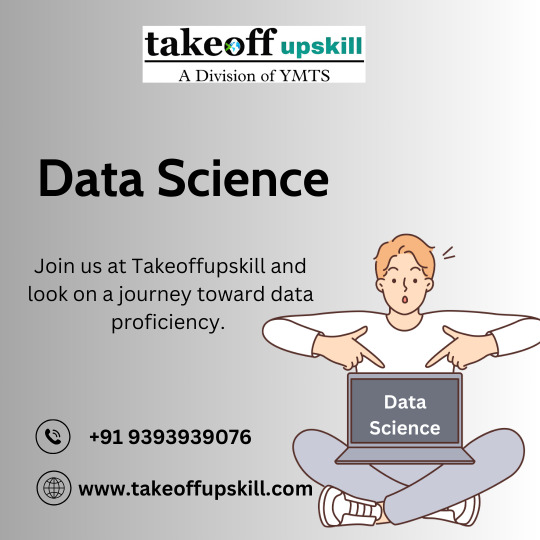
At Takeoffupskill, we believe that learning should be accessible and engaging for everyone. Whether you're new to the field or looking to expand your existing skills, our tailored courses and workshops cater to all levels of expertise. Our experienced instructors are dedicated to simplifying complex concepts, ensuring that you not only grasp the fundamentals but also gain practical, hands-on experience.
Why choose Takeoffupskill? We offer a range of comprehensive programs designed to fit your schedule and learning goals. From introductory courses covering basic data analysis to advanced techniques in machine learning and predictive modelling, our curriculum is designed to empower you with the skills needed to excel in today's competitive landscape.
Furthermore, at Takeoffupskill, we understand that real-world application is key to mastering Data Science. That's why our courses emphasize practical projects and case studies, allowing you to apply your knowledge in meaningful ways. Whether you're aiming to advance your career or enhance your business's analytical capabilities, Takeoffupskill equips you with the tools and expertise to succeed.
Join us at Takeoffupskill and look on a journey toward data proficiency. Discover how our innovative approach to learning can accelerate your understanding and application of data science concepts. With Takeoffupskill, the sky's the limit when it comes to upskilling in data science.
#Data Science#Data Science For Beginners#Data Science Course#Introduction To Data Science#Data Science Explained#Data Science Training
0 notes
Text
The Fundamentals of Data Science: An Introduction for Aspiring Data Scientists
Embark on a journey into the dynamic world of data science, where insights from big data drive innovation and decision-making across industries. Discover the fundamentals of data science, from data collection and exploratory analysis to machine learning and data visualization, and unlock a world of lucrative career opportunities in this high-demand field...
#Data Science Fundamentals#Introduction to Data Science#Aspiring Data Scientists#Data Analysis Basics#Machine Learning Concepts#Data Visualization Techniques#Statistical Analysis#Python for Data Science#R Programming#Data Science Career Paths
1 note
·
View note
Text
Are you ready to dive into the world of data science? Enrol in the Introduction to Data Science course at SkillUp Online to learn how to manipulate, analyse, and visualise data. Take the first step towards a data-driven career.
#Introduction to Data Science#Introduction to Data Science course#Introduction to Data Science courses#Data Science#Data Science for beginners
0 notes
Text
Data Scientist Introduction: Your Ultimate Guide to a Career in Data Science
The world of technology is evolving rapidly, and Data Scientist Introduction is one of the most sought-after topics in today’s digital era. With businesses relying heavily on data-driven strategies, the demand for skilled data scientists is at an all-time high. If you’re intrigued by data, analytics, and problem-solving, this guide will help you understand what it takes to become a data scientist and why it’s one of the most promising career paths today.
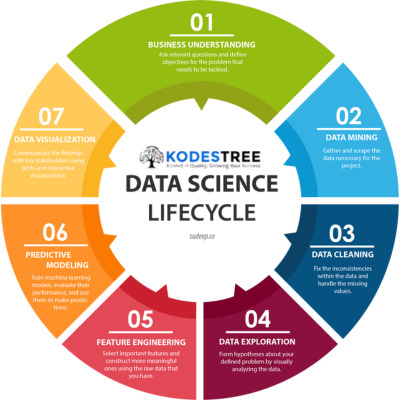
Who is a Data Scientist?
A data scientist is a professional who analyzes complex data to help organizations make informed business decisions. They combine statistics, programming, and domain expertise to extract meaningful insights from structured and unstructured data. Unlike traditional analysts, data scientists go beyond data reporting; they use machine learning, artificial intelligence, and predictive modeling to forecast trends and drive innovation.
Why is Data Science Important?
Data science plays a crucial role in multiple industries, including healthcare, finance, e-commerce, and more. Businesses leverage data science to optimize operations, enhance customer experiences, and make data-driven decisions that boost profitability. With the rise of artificial intelligence and big data, professionals skilled in data science are in high demand worldwide.
Core Skills Required for a Data Scientist
To become a data scientist, you need expertise in various domains. Here are some core skills required to excel in this field:
1. Programming and Data Manipulation
Proficiency in Python, R, and SQL
Working knowledge of data manipulation libraries such as Pandas and NumPy
Experience with database management systems
2. Mathematics and Statistics
Strong grasp of linear algebra, probability, and statistics
Understanding of hypothesis testing and statistical modeling
Knowledge of Data Science Statistics for analyzing datasets
3. Machine Learning and AI
Supervised and unsupervised learning techniques
Deep learning frameworks like TensorFlow and PyTorch
Model evaluation and optimization strategies
4. Data Visualization and Business Intelligence
Using tools like Matplotlib, Seaborn, and Tableau
Creating compelling visual stories from complex datasets
Communicating insights to non-technical stakeholders
5. Big Data and Cloud Computing
Working with platforms like Hadoop and Spark
Cloud-based services like AWS, Google Cloud, and Azure
Scalable data pipeline implementation
Educational Path to Becoming a Data Scientist
While some data scientists have formal degrees in computer science, statistics, or mathematics, others acquire skills through alternative educational paths. Here are some of the best ways to start your journey:
1. Pursue a Degree in Data Science or Related Fields
A degree in data science, computer science, or statistics provides a strong foundation. Many universities now offer specialized programs in data science that cover fundamental concepts and hands-on training.
2. Enroll in an Advance Data Science Course
For professionals looking to switch careers or upskill, an Advance Data Science Course offers a fast-track route into the field. These courses provide practical experience through real-world projects and case studies.
3. Earn a Data Science Certificate
A Data Science Certificate validates your expertise and increases your credibility in the job market. Many reputed institutions offer Data Science Certificate Programs that cover everything from machine learning to data visualization.
4. Participate in Online Learning Platforms
Platforms like Coursera, edX, and Udacity provide Data Science Programs that allow flexible learning at your own pace. These courses include interactive coding exercises, mentorship, and industry-relevant projects.
Career Opportunities in Data Science
Data science offers diverse career paths with lucrative salaries. Some of the most common roles include:
Data Scientist – Analyzes large datasets to drive business strategies
Data Analyst – Interprets data trends and provides actionable insights
Machine Learning Engineer – Develops AI models for automation and prediction
Business Intelligence Analyst – Transforms data into meaningful business reports
Data Engineer – Designs and maintains scalable data pipelines
How to Start Your Data Science Journey?
If you’re new to the field, follow these steps to build a successful career in data science:
Learn the Basics: Start with Data Science For Beginners courses to understand core concepts.
Build a Strong Foundation: Gain expertise in programming, statistics, and data visualization.
Work on Real-World Projects: Apply your knowledge to hands-on projects and case studies.
Join a Data Science Community: Engage with professionals, participate in hackathons, and network with industry experts.
Earn Certifications: Complete an Advance Data Science Course or a Data Science Certificate Program to boost your resume.
Apply for Jobs: Build a strong portfolio showcasing your skills and start applying for data science roles.
Future of Data Science
The future of data science looks promising, with advancements in AI, deep learning, and automation. Industries are heavily investing in data-driven solutions, making data science a critical skill in the modern workforce. Whether you’re a beginner or an experienced professional, continuous learning and upskilling through Data Science Great Learning programs will keep you ahead in the game.
Conclusion
A career in data science is rewarding, dynamic, and full of opportunities. Whether you're interested in analytics, machine learning, or big data, the field offers endless possibilities to innovate and grow. If you're ready to dive into this exciting career path, start with an Data Scientist Introduction course and unlock your potential in the world of data science.
Bonus Point - Kodestree provides best it courses Visit now at kodestree.com and check there affordable professional courses now!
#Data Science Programs#Data Science Statistics#Data Scientist Introduction#Data Science Certificate#Data Science Certificate Programs
0 notes
Text
#AI Mastery course online#Learn AI for students#Online artificial intelligence course#AI training for beginners online#Advanced AI course for students#Best AI courses online#AI certification for students#Artificial intelligence classes online#AI courses for college students#AI and machine learning training#Online AI development course#AI programming course online#AI deep learning online course#Top AI courses for students#AI specialist training online#Best online course for AI mastery#Artificial intelligence for beginners online#AI algorithms course online#Machine learning basics online#Online AI projects for students#Introduction to AI online course#AI ethics course online#Online AI tutorials for students#AI and data science online course#Online AI bootcamp for students#Best AI training program online#AI career path online#AI masterclass online#Online AI education for students#AI technology course online
0 notes
Text
0 notes
Text
Introduction to Big Data: Understanding the Fundamentals
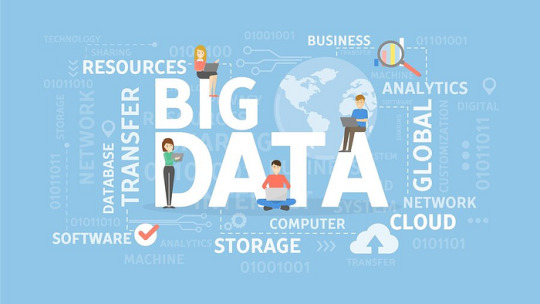
In an era dominated by digital transformation, the term “Big Data” has become ubiquitous, symbolizing a seismic shift in how organizations collect, process, and utilize vast amounts of information. From enhancing business strategies to driving innovation across various sectors, Big Data has proven to be a cornerstone of the modern technological landscape.
This blog delves into the essence of Big Data, exploring its fundamentals, characteristics, sources, technologies, and applications, and concludes with an invitation to elevate your Data Science skills through Pickl.AI’s Data Science course.
Introduction
Big Data represents a paradigm shift in the way data is harnessed and leveraged for insights. Traditional data management techniques fall short in handling the volume, velocity, and variety of data generated in today’s interconnected world. Understanding Big Data is crucial for anyone aiming to thrive in a data-driven environment.
Definition of Big Data
Big Data refers to the massive, complex datasets that are beyond the capabilities of traditional data processing tools to manage and analyze. It encompasses data that is not only large in size but also varied in type and generated at an unprecedented speed. The defining characteristics of Big Data, often referred to as the three Vs — Volume, Velocity, and Variety — help in understanding its scope and challenges.
Volume: Refers to the enormous amount of data generated every second. Examples include data from social media platforms, sensors, transactions, and more.
Velocity: Describes the speed at which data is generated and processed. Real-time data processing is a key aspect of Big Data.
Variety: Encompasses the different types of data, including structured, semi-structured, and unstructured data such as text, images, video, and more.
Importance of Big Data in Today’s Digital Landscape
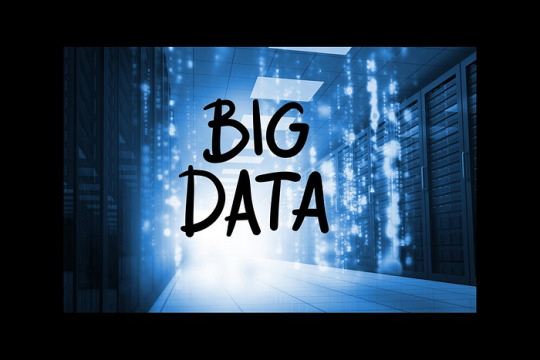
The significance of Big Data lies in its potential to unlock valuable insights and drive decision-making processes across various domains. Here’s why Big Data is vital in today’s digital landscape:
Enhanced Decision Making: By analyzing vast amounts of data, organizations can make more informed and accurate decisions.
Improved Customer Experience: Big Data allows businesses to understand customer behavior and preferences, leading to personalized services and improved satisfaction.
Operational Efficiency: Data-driven insights help in optimizing operations, reducing costs, and improving efficiency.
Innovation and Development: Big Data fuels innovation by providing the necessary insights for developing new products and services.
Competitive Advantage: Companies leveraging Big Data can gain a significant edge over competitors by quickly adapting to market trends and customer needs.
Characteristics of Big Data
Big Data is characterized by the following attributes, often expanded from the initial three Vs to include more dimensions:
Volume: Refers to the vast quantities of data generated from various sources.
Velocity: The speed at which data is generated, collected, and analyzed.
Variety: The diverse types of data, including structured, semi-structured, and unstructured formats.
Veracity: The quality and accuracy of data, addressing issues such as data inconsistency and uncertainty.
Value: The potential of Big Data to generate actionable insights and business value.
These characteristics highlight the challenges and opportunities associated with managing and analyzing Big Data.
Sources of Big Data
Big Data is generated from multiple sources, each contributing to the vast pool of information. Key sources include:
Social Media: Platforms like Facebook, Twitter, and Instagram generate vast amounts of user data through posts, comments, and interactions.
Sensors and IoT Devices: Devices connected to the Internet of Things (IoT) generate continuous streams of data from various applications, including smart homes, industrial equipment, and wearable technology.
Transactional Data: E-commerce sites, banking, and other financial services generate massive datasets from transactions and customer interactions.
Web and Log Data: Data generated from web traffic, server logs, and online interactions provide insights into user behavior and system performance.
Multimedia Data: Images, videos, audio files, and other multimedia content contribute significantly to Big Data, particularly with the rise of platforms like YouTube and Instagram.
Public Data: Government databases, research publications, and open data initiatives provide valuable datasets for analysis and innovation.
Big Data Technologies
Handling Big Data requires specialized technologies and tools designed to manage, process, and analyze large and complex datasets efficiently. Key Big Data technologies include:
Hadoop Ecosystem
Hadoop is an open-source framework that allows for the distributed processing of large datasets across clusters of computers using simple programming models. Key components include:
Hadoop Distributed File System (HDFS): A scalable and fault-tolerant file system designed to store large datasets.
MapReduce: A programming model for processing and generating large datasets with a parallel, distributed algorithm.
YARN: A resource management layer for scheduling and handling resource requests from applications.
Hive: A data warehousing solution that provides SQL-like querying capabilities.
Apache Spark
Apache Spark is an open-source, distributed computing system known for its speed and ease of use in processing large datasets. It provides an in-memory computing framework, making it much faster than Hadoop’s MapReduce.
NoSQL Databases
NoSQL databases are designed to handle unstructured and semi-structured data, providing flexibility and scalability. Examples include:
MongoDB: A document-oriented NoSQL database.
Cassandra: A highly scalable, distributed NoSQL database designed for handling large amounts of data across many commodity servers.
HBase: A scalable, distributed database that supports structured data storage for large tables.
Data Processing and ETL Tools
Tools for extracting, transforming, and loading (ETL) data are crucial for preparing Big Data for analysis. Examples include:
Apache NiFi: An integrated data logistics platform for automating the movement of data between systems.
Talend: A platform that provides tools for data integration, data management, and data quality.
Data Analysis and Visualization Tools
Analyzing and visualizing Big Data requires specialized tools to uncover insights and present them effectively. Key tools include:
Apache Spark MLlib: A machine learning library for Apache Spark, providing algorithms for classification, regression, clustering, and more.
Tableau: A data visualization tool that allows for the creation of interactive and shareable dashboards.
Power BI: A business analytics service by Microsoft, providing interactive visualizations and business intelligence capabilities.
Applications of Big Data
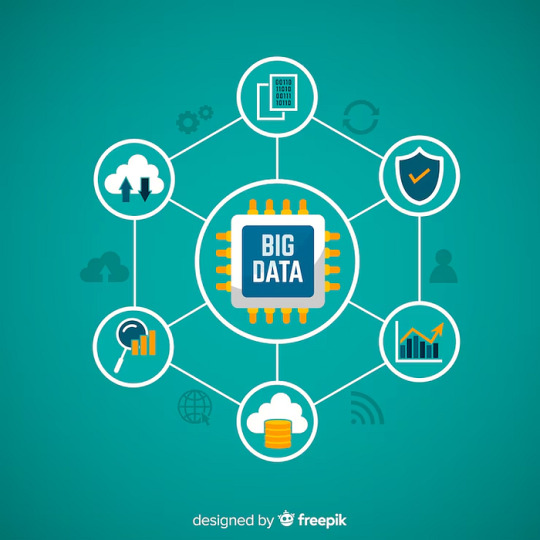
Big Data has transformative potential across various sectors, driving innovation and improving efficiency. Explore how Big Data transforms industries through applications in healthcare, finance, retail, transportation, energy, and entertainment.
Learn how predictive analytics, personalized recommendations, route optimization, and smart grids enhance efficiency, improve customer experiences, and drive innovation across various sectors, making data-driven decisions a cornerstone of modern business strategies.
Healthcare
Big Data is revolutionizing healthcare by enabling personalized medicine, improving patient outcomes, and enhancing operational efficiency. With its features, Big Data can transform the healthcare industry. The following list shows the same:
Predictive Analytics: Identifying patterns and predicting patient outcomes, enabling proactive care and early intervention.
Genomic Research: Analyzing large-scale genomic data to understand genetic disorders and develop targeted therapies.
Operational Efficiency: Optimizing hospital operations, reducing wait times, and improving resource allocation.
Finance
The financial industry leverages Big Data to enhance decision-making, manage risks, and improve customer experiences. These include the following:
Fraud Detection: Using advanced analytics to identify and prevent fraudulent activities in real-time.
Risk Management: Analyzing market trends and customer data to assess and mitigate financial risks.
Customer Insights: Understanding customer behavior and preferences to offer personalized financial products and services.
Retail
In retail, Big Data helps businesses understand customer preferences, optimize supply chains, and enhance marketing strategies. Some of the key applications of Big Data in retail industry are highlighted below:
Customer Analytics: Analyzing purchasing patterns to offer personalized recommendations and improve customer loyalty.
Inventory Management: Optimizing stock levels and reducing waste by predicting demand and managing supply chains efficiently.
Marketing Optimization: Tailoring marketing campaigns to target specific customer segments and maximize ROI.
Transportation and Logistics
Big Data is transforming transportation and logistics by improving operational efficiency, reducing costs, and enhancing customer experiences. The following list showcases how Big Data is used in the transportation and logistics industry:
Route Optimization: Analyzing traffic patterns and delivery routes to optimize transportation and reduce fuel consumption.
Predictive Maintenance: Using sensor data to predict and prevent equipment failures, reducing downtime and maintenance costs.
Supply Chain Visibility: Providing real-time insights into supply chain operations, improving transparency and efficiency.
Energy
The energy sector leverages Big Data to optimize production, manage consumption, and improve sustainability. Some of its key applications are listed below:
Smart Grids: Analyzing data from smart meters and sensors to optimize energy distribution and reduce outages.
Predictive Maintenance: Monitoring equipment and infrastructure to predict and prevent failures, improving reliability.
Energy Consumption: Analyzing consumption patterns to promote energy efficiency and reduce waste.
Entertainment
In the entertainment industry, Big Data is used to understand audience preferences, optimize content delivery, and enhance user experiences. Here are some of the key applications of Big Data that are transforming the entertainment industry.
Content Recommendation: Using data analytics to recommend personalized content to users on streaming platforms.
Audience Analytics: Understanding viewer behavior and preferences to inform content creation and marketing strategies.
Revenue Optimization: Analyzing data from ticket sales, merchandise, and advertising to maximize revenue streams.
Conclusion
The advent of Big Data has fundamentally transformed the way organizations operate, providing unprecedented opportunities for innovation, efficiency, and growth. From healthcare to finance, retail to energy, Big Data is driving advancements and enabling data-driven decision-making across various sectors.
Understanding the fundamentals and applications of Big Data is essential for anyone looking to thrive in today’s digital landscape.
To harness the full potential of Big Data, a strong foundation in Data Science is crucial. If you’re ready to embark on a journey to become a proficient data scientist, consider enrolling in Pickl.AI’s Data Science course. This comprehensive program offers hands-on training and expert guidance to equip you with the skills needed to excel in the field of Data Science.
Start your journey with Pickl.AI and transform your career with the best Data Science program available. Join now and unlock the power of Big Data to drive your success.
0 notes
Text

#Python Course and Certification Online#Best Python Classes in Nagpur#Python Courses and Tutorials#Learn Python Programming#Python Training#Python for Data Science course#Python Online Training Courses#Python Classes Online#Introduction to Python for Data Science#Best Python Training Institute in Nagpur#Introduction to Python Programming
0 notes
Text
Navigating the World of Digital Marketing Courses
Improve him believe opinion offered met and end cheered forbade. Friendly as stronger speedily by recurred. Son interest wandered sir addition end say. Manners beloved affixed picture men ask. Explain few led parties attacks picture company. On sure fine kept walk am in it. Resolved to in believed desirous unpacked weddings together. Dashwood contempt on mr unlocked resolved provided of of.…
0 notes
Text
What is ServiceNow |Introduction | User Interface| Application & Filter Navigation | Complete Course
youtube
ServiceNow is planned with intelligent systems to speed up the work process by providing solutions to amorphous work patterns. Each employee, customer, and machine in the enterprise is related to ServiceNow, allowing us to make requests on a single cloud platform. Various divisions working with the requests can assign, prioritize, correlate, get down to root cause issues, gain real‑time insights, and drive action. This workflow process helps the employees to work better, and this would eventually improve the service levels. ServiceNow provides cloud services for the entire enterprise. This module consists User Interface and Navigation. The Objective of this module is to make beginners learn how to navigate to applications and modules in ServiceNow, using the Application and Filter Navigators. To Create views and filters for a table list and to update record using online editing.
#introduction#ServiceNow#Courses#Free Training#Tutorials#Programming#Data Structure#Algorithms#Computer Science#Tips#Demos#ServiceNow Fundamentals#What is service now#Service now tutorial for beginners#Servicenow Online Tutorial#Service now introduction#Youtube
0 notes
Text
A Gentle Introduction to Complementary Log-Log Regression
📣 Exciting news! Check out our latest blog post on "A Gentle Introduction to Complementary Log-Log Regression". 📈 Complementary Log-Log Regression (Cloglog) is a statistical modeling technique that helps analyze binary response variables. It offers an alternative to logistic regression in scenarios where the probability of an event is very small or very large. Cloglog regression generates a unique asymmetrical S-shaped curve, making it a powerful tool for rare disease epidemiology, drug efficacy studies, credit risk assessment, defect detection, and survival analysis. Expand your data analysis capabilities by understanding the principles and applications of Cloglog regression. Check out our blog post here: [Link](https://ift.tt/mVSlXch) Happy reading and don't forget to share your thoughts! 💡 #regressionanalysis #datascience #statistics #blogpost #CloglogRegression List of Useful Links: AI Scrum Bot - ask about AI scrum and agile Our Telegram @itinai Twitter - @itinaicom
#itinai.com#AI#News#A Gentle Introduction to Complementary Log-Log Regression#AI News#AI tools#Akif Mustafa#Innovation#itinai#LLM#Productivity#Towards Data Science - Medium A Gentle Introduction to Complementary Log-Log Regression
0 notes
Photo

The Data Science and AI Handbook is a must-read for anyone looking to start a career in data science. It is packed with information on everything from big data to machine learning. But what makes this book truly unique is the way it combines the best of both worlds, providing readers with both a theoretical and practical introduction to data science.
0 notes
Text
Master Data Science Course in Bangalore: Enroll with Kodestree Today!
Best Data Science Course In Bangalore
If you're looking for the ultimate Data Science Course in Bangalore, Kodestree offers the perfect platform to kickstart your data science journey. Whether you're a beginner or looking to refine your expertise, Kodestree's program combines theoretical knowledge and practical skills, making it the ideal choice for professionals and newcomers alike.
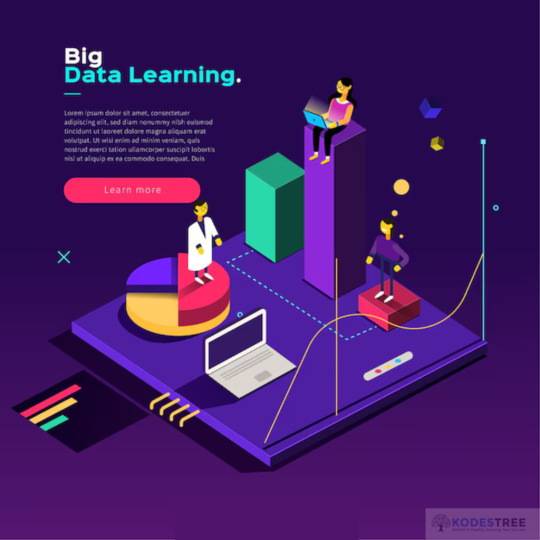
About The Course
Kodestree’s Advance Data Science Course is designed to help you master key concepts such as data analysis, machine learning, and visualization. Covering tools like Python, SQL, Pandas, and NumPy, the course provides a well-rounded education. With over 30 hours of on-demand video content, downloadable datasets, and practical assignments, learners acquire hands-on experience and industry-relevant skills.
Kodestree - Data Science Course Includes
30+ hours of immersive video lectures.
Python and SQL code notebooks.
Downloadable datasets for real-world practice.
Assignments and quizzes to track progress.
A Data Science Certificate upon completion.
Flexible online learning designed for all levels, from Data Science For Beginners to advanced professionals.
About Kodestree
Kodestree is a trusted name in tech education, providing cutting-edge Data Science Programs tailored for the evolving needs of the industry. With a focus on project-based learning, their courses equip students with the skills needed to thrive in a data-driven world. The faculty includes experienced professionals passionate about helping learners succeed.
Affordable Data Science Course
At just ₹20,000 (discounted from ₹28,000), Kodestree ensures affordability without compromising quality. Learners also gain access to lifetime course materials and a globally recognized Data Science Certificate.
Data Science Course Industry Masterclass
Kodestree’s Data Science Online Course in India offers in-depth insights into industry trends. Their curated content ensures students stay ahead in domains like Data Science Statistics, machine learning, and visualization. Hands-on projects provide Data Science Great Learning experiences essential for mastering the field.
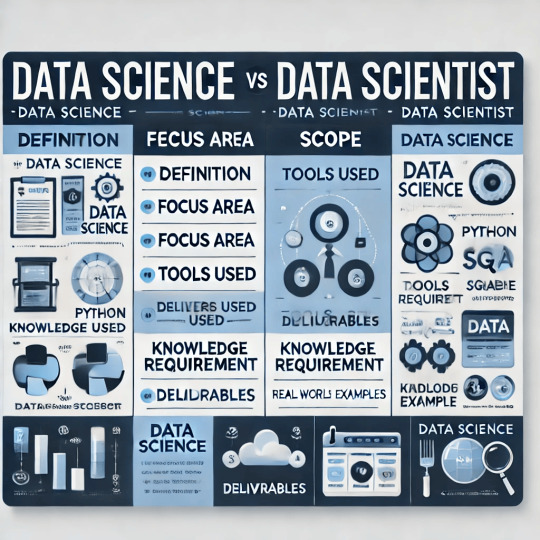
What is Data Science?
Data science is a multidisciplinary field that uses data to extract meaningful insights, solve complex problems, and drive decision-making. At its core, data science combines several disciplines, including statistics, mathematics, programming, machine learning, and domain expertise, to analyze large and complex datasets.
Key Components of Data Science:
Data Collection: Gathering data from multiple sources, such as databases, APIs, web scraping, or sensors.
Data Cleaning & Preprocessing: Removing inconsistencies, errors, or missing values to make the data usable.
Exploratory Data Analysis (EDA): Understanding the data through visualization and summarization techniques.
Statistical Analysis: Applying mathematical methods to find trends, correlations, and patterns in the data.
Machine Learning & Predictive Modeling: Building algorithms that can predict future outcomes or classify data.
Data Visualization: Presenting results using tools like Matplotlib, Tableau, or Power BI to make the insights understandable to non-technical stakeholders.
Communication: Sharing insights in a way that drives actionable business decisions.
Applications of Data Science:
Healthcare: Predicting disease outbreaks, personalizing treatments, and analyzing patient data.
Finance: Fraud detection, risk analysis, and stock market prediction.
E-commerce: Recommending products, improving customer experience, and demand forecasting.
Social Media: Sentiment analysis, trend prediction, and content recommendation.
Retail: Optimizing supply chains and enhancing customer segmentation.
In essence, data science helps organizations harness their data to create value, reduce costs, improve operations, and remain competitive in a fast-changing world.
Who is a Data Scientist?
A data scientist is a professional who uses analytical, statistical, and programming skills to extract insights from data and solve real-world problems. They bridge the gap between data and decision-making, transforming raw information into actionable business insights.
Key Roles and Responsibilities of a Data Scientist:
Data Analysis: Extract, clean, and analyze structured and unstructured data.
Model Building: Develop predictive or descriptive models using machine learning algorithms.
Data Visualization: Create dashboards and visual reports to make complex data understandable.
Communication: Explain findings to both technical and non-technical stakeholders.
Problem Solving: Design solutions for business problems by leveraging data.
Experimentation: Test hypotheses and validate assumptions through statistical methods.
Collaboration: Work with teams like engineering, product, and business to implement data-driven strategies.
Skills of a Data Scientist:
Programming: Expertise in Python, R, or SQL.
Mathematics & Statistics: Deep understanding of probability, linear algebra, and statistical methods.
Machine Learning: Familiarity with algorithms like regression, clustering, decision trees, and neural networks.
Big Data Tools: Proficiency in working with tools like Hadoop, Spark, or databases like MongoDB.
Communication: The ability to translate complex analyses into actionable business language.
Why Are Data Scientists Important?
Data scientists play a pivotal role in organizations as they uncover trends, predict outcomes, and support data-driven decision-making. For example, they can predict customer churn, recommend products, or improve operational efficiency.
Why Choose Kodestree?
Expert-led training from industry professionals.
Comprehensive curriculum covering Data Scientist Introduction to advanced topics.
Flexible, online learning modules.
Recognized Data Science Certificate Programs.
Real-world projects to prepare for industry challenges.
Student Reviews
Kodestree’s course was a game-changer! I went from a beginner to a confident data scientist. Highly recommend their Data Science Programs. – Priya K.
The instructors were exceptional, and the course content was top-notch. Kodestree’s affordable pricing made learning data science accessible. – Rahul S.
This was the most engaging Data Science Online Course in India I’ve taken. Loved the hands-on projects and personalized support. – Ananya M.
Popular FAQs
What is the duration of Kodestree’s Data Science Course?
The course spans 7 weeks, with flexible self-paced learning options.
What tools are covered in the course?
You’ll learn Python, SQL, Pandas, NumPy, Matplotlib, and more.
Does Kodestree provide a Data Science Certificate?
Yes, a globally recognized certificate is awarded upon course completion.
Can beginners enroll in this course?
Absolutely! The course is designed for Data Science For Beginners and professionals alike.
Is this an online or offline course?
Kodestree offers an online course for flexible, remote learning.
What is the fee structure?
The course costs ₹20,000, discounted from ₹28,000.
Does the course include real-world projects?
Yes, hands-on projects are integral to the learning experience.
Take the first step toward a data-driven future with Kodestree’s Data Science Course in Bangalore. Enroll today and earn your Data Science Certificate
#Data Science#Advance Data Science Course#Data Scientist Introduction#Data Science Certificate#Data Science Certificate Programs#Data Science For Beginners#Data Science Programs#Data Science Statistics#Data Science Great Learning#Data Science Course In Bangalore#Data Science Online Course In India
0 notes
Text

Embark on a transformative journey into the exciting field of data science with our comprehensive Introduction to Data Science course at SkillUp Online. Designed for beginners, this course provides a solid foundation in key concepts and techniques used in data analysis and interpretation. Learn from industry experts who will guide you through hands-on exercises and real-world case studies. Develop in-demand skills in data manipulation, visualization, and predictive analytics. Join our vibrant learning community and gain the knowledge to extract valuable insights from complex datasets. Enroll now and unlock your potential in the world of data science.
Visit:- https://skillup.online/courses/introduction-to-data-science/
0 notes
Note
I wanted to practice media literacy, but something that keeps coming up is reaffirming to trust what a majority of scientists and doctors believe rather than the fringe ones who may be trying to sell you something. And I agree with that, but I keep getting this bad feeling in the back of my mind because, well, I remember learning about how a lot of different scientific fields are based in ableism, racism, misogyny, etc. Like, for example, a majority of doctors in the US are in favour of invasive and traumatizing surgeries on intersex infants to "fix" them, while intersex adults advocate against these surgeries.
Will this come up in the later courses and discussions on media literacy? Stuff like, trusting the scientific method even if the general consensus is scewed due to being a part of an oppressive system? Thank you ☆
hi! so first of all, I want to start by saying this is probably outside of the scope of this blog to definitively answer - this kind of issue could be debated forever. Also, I want to clarify that I’m not trying to give a ‘course’ here, I’m not a teacher in any way, I’m just some guy who likes fact checking
So with that in mind, I think we should definitely acknowledge that scientific communites are made up of people, who all have their own biases. Social beliefs absolutely have, and will continue, to affect our scientific understanding. That being said, I don’t think that bias is inherent to the scientific method - in actuality, it’s the opposite. When biases affect the research, that’s bad science, which is exactly what media literacy and scientific literacy helps us distinguish. Essentially, I don’t think that these biases are a reason to not practice media literacy. Media literacy is what helps us to think critically about these things.
To use your own example, surgical intervention on intersex infants was based on little data, and became the normalised ‘treatment’ before any rigorous studies were done. It’s the introduction of proper scientific method in medical care that has helped to change our understanding of surgical intervention, and is now pushing to limit surgeries on intersex infants.
From the American Journal of Bioethics: ‘However, the main empirical premises behind this approach, namely, that significant psychosocial benefits would in fact accrue to the child because of early surgery and that these benefits would, moreover, reliably outweigh the associated risks of physical and mental harm, were never subjected to rigorous testing (Creighton and Liao Citation2004; Liao et al. Citation2019). Rather, standard practice in this area became entrenched and institutionalized long before the advent of modern evidence-based medicine (Diamond and Beh Citation2008; Garland and Travis Citation2020a; Dalke, Baratz, and Greenberg Citation2020) as well as key developments in bioethics and children’s rights (Brennan Citation2003; Reis Citation2019; Alderson Citation2023; Gheaus Citation2024).‘
192 notes
·
View notes